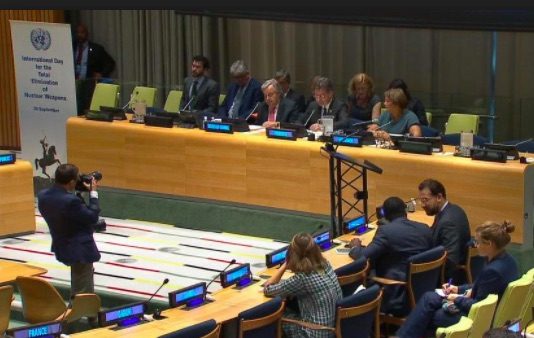DISARMAMENT & SECURITY .
An article from the United Nations Press Centre
Against a backdrop of rising tensions on the Korean Peninsula, speakers in the General Assembly today emphasized the urgent need for firm political will to advance towards the total elimination of all nuclear weapons.
Ministers and representatives of 46 Member States, delegations, the United Nations system and civil society took the floor during a day-long General Assembly high-level meeting held on September 26 to commemorate the International Day for the Total Elimination of Nuclear Weapons.

“The only world that is safe from the use of nuclear weapons is a world that is completely free of nuclear weapons,” said Secretary‑General António Guterres, recalling that nuclear disarmament had been a principled objective of the United Nations from the very first Assembly resolution in 1946 to the Treaty on the Prohibition of Nuclear Weapons, which had opened for signature on 20 September.
In opening remarks, he noted, however, that the universally held goal of disarmament had been challenged of late, including by a series of provocative nuclear and missile tests by the Democratic People’s Republic of Korea. Unequivocally condemning Pyongyang’s actions, he welcomed the Security Council’s firm response and its desire for a peaceful, diplomatic and political solution.
He went on to note significant steps by nuclear-weapon States — especially the Russian Federation and the United States — to cut back their arsenals. However, subsequent expensive modernization campaigns and the absence of planned arsenal reductions made it hard to see how disarmament could move forward, he said.
General Assembly President Miroslav Lajčák (Slovakia) described the Treaty as a sign of determination. Pledging to do everything possible during his term in office to realize the vision of a nuclear-weapon-free world, he said discussions that had led to that instrument’s adoption should continue to ensure that all the differing views of Member States were properly addressed.
In the ensuing debate, speakers underlined the humanitarian and environmental consequences of an accidental or deliberate detonation of nuclear weapons, with some highlighting how money spent on producing, maintaining and modernizing them could be better invested in sustainable development.
Speaking on behalf of the Non-Aligned Movement, Jorge Arreaza, Venezuela’s Minister for Foreign Affairs, urged Member States to support the convening of an international conference on nuclear disarmament at the United Nations no later than 2018. “As long as nuclear weapons exist, the risk of proliferation exists”, emphasizing the need for a new comprehensive and systematic approach to disarmament, he said.
Numerous delegates condemned the Democratic People’s Republic of Korea for violating international law and ignoring Security Council resolutions in its pursuit of nuclear weapons. Many appealed for dialogue and a diplomatic solution, and for all sides to refrain from rhetoric that might inflame the situation.
(Continued in right column)
Can we abolish all nuclear weapons?
(Continued from left column)
Japan’s delegate, recalling the atomic bombing of Hiroshima and Nagasaki in 1945, said the Democratic People’s Republic of Korea’s nuclear tests were not only a grave and imminent threat, but also a challenge to the disarmament and non-proliferation regime.
Two of the five nuclear-weapon States shared their perspective, with China’s representative saying disarmament efforts must proceed in a step-by-step manner through existing mechanisms to ensure the participation of all countries.
His counterpart from the Russian Federation, asserting that the Treaty for the Prohibition of Nuclear Weapons had been developed in haste, said nuclear-weapon States had had good reasons for not attending the recent conference. The instrument ignored the existing reality and the opinion of nuclear-weapon States, he said, noting that it should have been adopted by consensus instead of through a vote. The focus now should be on creating a favourable atmosphere for progress towards disarmament on the principle of equal, indivisible security for all States without exception.
Raising another concern, he voiced regret over recent attempts to torpedo the Joint Comprehensive Plan of Action on Iran’s nuclear programme, stressing that all parties should continue to implement the agreement in good faith. The same approach must be taken with regard to the tensions on the Korean Peninsula, the cause of which was not only Pyongyang’s possession of nuclear weapons, but the absence of an overall security mechanism for the region as a whole, he said.
Germany’s representative, underscoring his country’s commitment to the North Atlantic Treaty Organization (NATO), said disarmament efforts could only succeed if they took the prevailing security environment into account. With like-minded partners, Germany advocated a step-by-step approach, with the Non-Proliferation Treaty at the core of an effort that would include a fresh nuclear arms control agreement between the Russian Federation and the United States, which together controlled 90 per cent of the world’s estimated 15,000 nuclear weapons.
The representative of South Africa, which had voluntarily dismantled its nuclear weapons programme, said there were “no safe hands” when it came to weapons of mass destruction. He expressed deep concern about the catastrophic consequences of detonating atomic bombs, a point highlighted in three international conferences on the humanitarian impact of nuclear weapons.
Turning to the Comprehensive Nuclear-Test-Ban Treaty, several speakers appealed for the remaining Annex II countries that had yet to sign or ratify that instrument to do so. Delegates from the Middle East, noting that Israel was not a party to the Non-Proliferation Treaty, expressed frustration that a nuclear-weapon-free zone had yet to be established in the region.
Also speaking today were ministers, senior officials and representatives of El Salvador (on behalf of the Community of Latin American and Caribbean States), Guyana, Indonesia, Maldives, Iran, Philippines, Cuba, Algeria, Turkey, Thailand, Peru, Brazil, Mexico, Austria, India, Costa Rica, United Republic of Tanzania, Jamaica, Libya, Kazakhstan, Bangladesh, Ukraine, Ecuador, Egypt, Pakistan, Morocco, Iraq, Nigeria, Saudi Arabia, Sri Lanka, Colombia, Chile, Honduras, Argentina, Samoa, Guatemala, Ireland, Timor-Leste, Malaysia and Sweden, as well as the Holy See and the League of Arab States. Also speaking were representatives of two civil society groups: Basel Peace Office and Parliamentarians for Nuclear Non-Proliferation and Disarmament.
Click here for the speeches.